The best lenses for Nikon D3400 for all types of photography.
The Nikon D3400 is an affordable DSLR camera for beginners that was introduced in 2016. It has a durable battery, small size and weight while featuring the sensor and processor technology that professional Nikon cameras have.
This camera has a lens in the set, which is not bad at all. However, to make the most out of this camera, you might need to find a better lens for Nikon D3400.
In this review, I will tell you about the best lenses for Nikon D3400 suitable for taking landscape, portrait and casual photos. I’ve selected these models as they combine excellent image quality, top-notch overall performance, compactness and a good price.
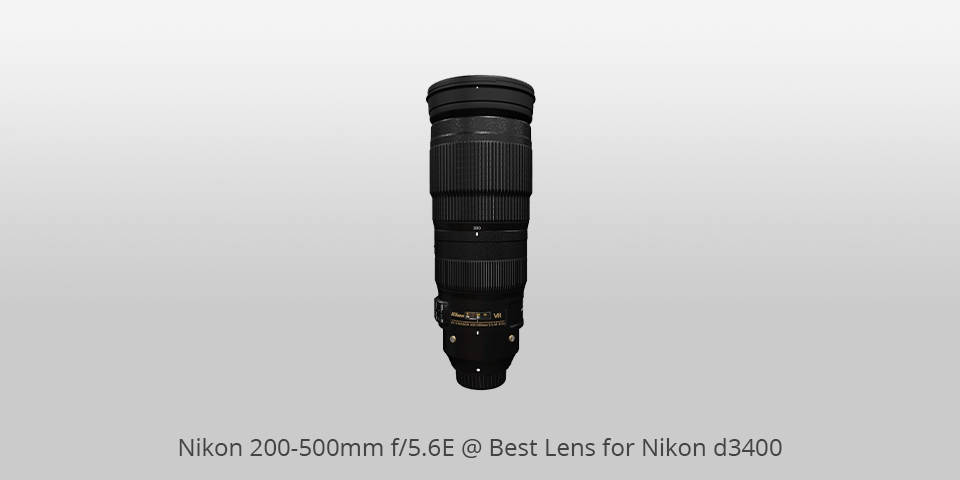
Mount: E | Diaphragm blades: 9 | Autofocus:good | Min focus distance: 2.2 m | Max magnification: 0.22x| Filter thread: 95 mm | Dimensions (WxL): 500 mm | Weight: 5.07 lbs
⊕ Crisp optics
⊕ Long telephoto reach
⊕ Optical stabilization
⊖ Zoom worse than in other lenses
With the help of this Nikon D3400 zoom lens, you can take amazing photos of birds, wildlife, motorsports, sportsmen, performers, scenery and different objects that are far from you. Due to a speedy f/5.6 aperture, you will get beautifully defocused backgrounds across the zoom range.
In addition, the lens elements boast super-integrated coating, which eliminates flare and ghosting and provides contrasted and clear images. A Wave Motor AF system accounts for fast and quiet focusing, which is beneficial for shooting pictures and videos. The electromagnetic diaphragm works synchronously to capture fast-moving subjects.
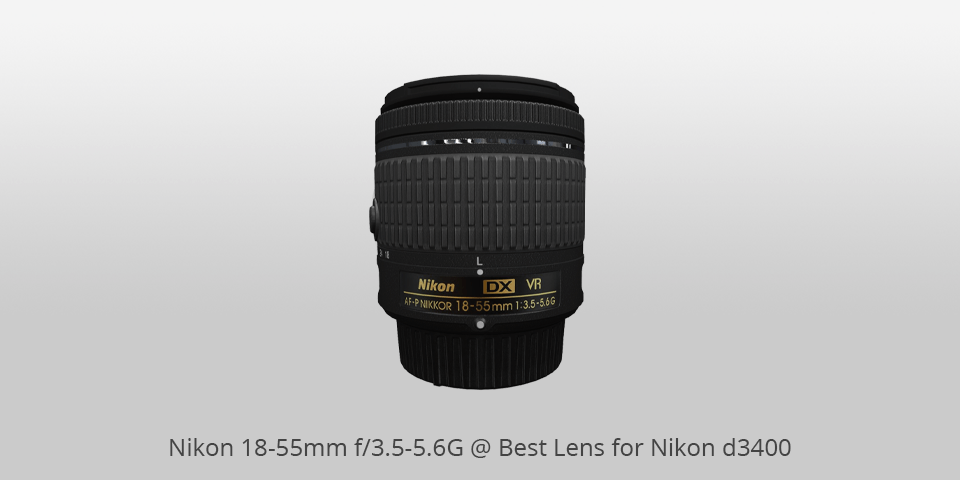
Mount: FE | Diaphragm blades: 7| Autofocus: good | Min focus distance: 0.28 m | Max magnification: 0.17x| Filter thread: 52 mm | Dimensions (WxL): 55 mm | Weight: 7.2 ounces
⊕ Nice quality of the image
⊕ Quite sharp
⊕ Portable
⊖ Poor build quality
With this lens, you can take pictures of everything. It’s the newest addition to the Nikon “P” lens series that has a pulse motor for speedy and quiet autofocusing. Two aspherical lens elements provide excellent optical performance.
Using this lens, you can shoot scenery, group photos, portraits, sports events and beautiful HD videos with exceptional clarity and sharpness. VR image stabilization enhances the camera’s performance in poor-light conditions and creates steady videos.
This is a small-sized, lightweight and universal lens. Using it, you are sure to take stunning photos.
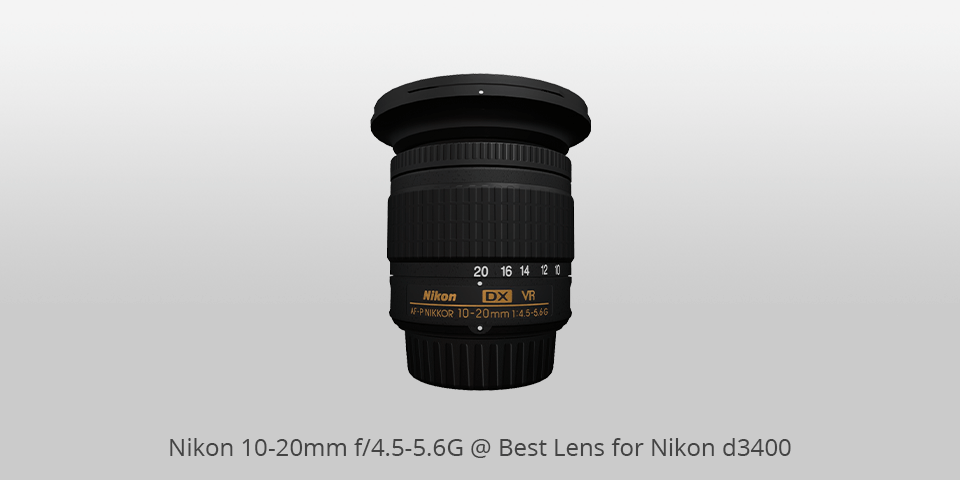
Mount:E | Diaphragm blades: 11 | Autofocus:good | Min focus distance: 0.3 m | Max magnification: 0.17x | Filter thread: 72 mm | Dimensions (WxL): 20 mm | Weight: 0.51 lbs
⊕ Excellent sharpness
⊕ Amazing CA control
⊕ Low flare
⊕ Minimal distortion
⊖ Neither dustproof nor waterproof
This is a wide angle lens for Nikon D3400, suitable for taking pictures of scenery, cities, architecture, interiors as well as group photos. Its silent autofocusing and Vibration Reduction (VR) image stabilization help record amazing videos.
Besides, this lens is affordable, portable, lightweight and convenient for carrying around when you are traveling.
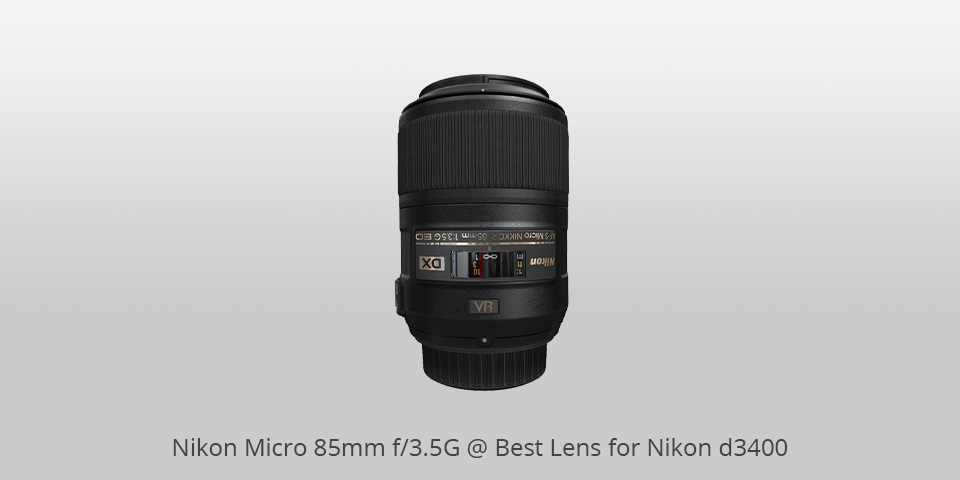
Mount: AF | Diaphragm blades: 9 | Autofocus: good | Min focus distance: 28.6cm | Max magnification: 11x | Filter thread: 73 mm | Dimensions (WxL): 85 mm | Weight: 0.78 lbs
⊕ Great sharpness
⊕ Small size
⊕ A good optical stabilization system
⊖ Lacks a focus limiter switch
It is one of the best lenses for Nikon D3400 as it’s small-sized and doesn’t weigh much. Also, it boasts amazing optics. Due to the Nikon’s second-generation VR system, it provides steady images to the sensor and viewfinder and makes hand-held shooting very flexible.
A 1:1 magnification ratio lets you take life-size textured and detailed close-ups. Silent Wave Motor creates smooth autofocus and together with the internal focusing system makes this camera lens ideal for shooting the subject from a very close range.
It’s simple to use and can help you discover the whole world of macro photography.
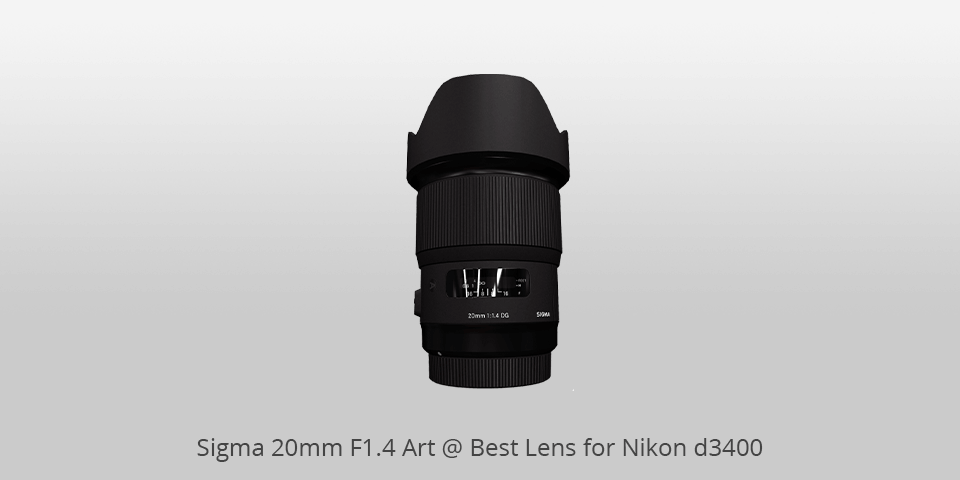
Mount: F| Diaphragm blades: 9 | Autofocus: good| Min focus distance: 27.6 cm | Max magnification: 0.14× | Filter thread:20 mm | Dimensions (WxL): 20 mm | Weight: 2.10 lbs
⊕ Excellent sharpness
⊕ Virtually no distortion
⊕ Small min focus distance
⊖ Dim corners and edges
This is the latest wide-angle prime lens created for full-frame cameras. However, you can also use it with APS-C sensors. Thanks to more than 50-year experience in lens designing and the knowledge gained from the 35mm 1.4 and the 24mm 1.4 Art lenses, Nikon has created the 20mm 1.4 Art lens that has the widest aperture today.
Its modern optical design accounts for top-notch image quality. This lens contains 15 elements in 11 groups, with the “F” Low-Dispersion glass and Special Low-Dispersion glass elements among them.
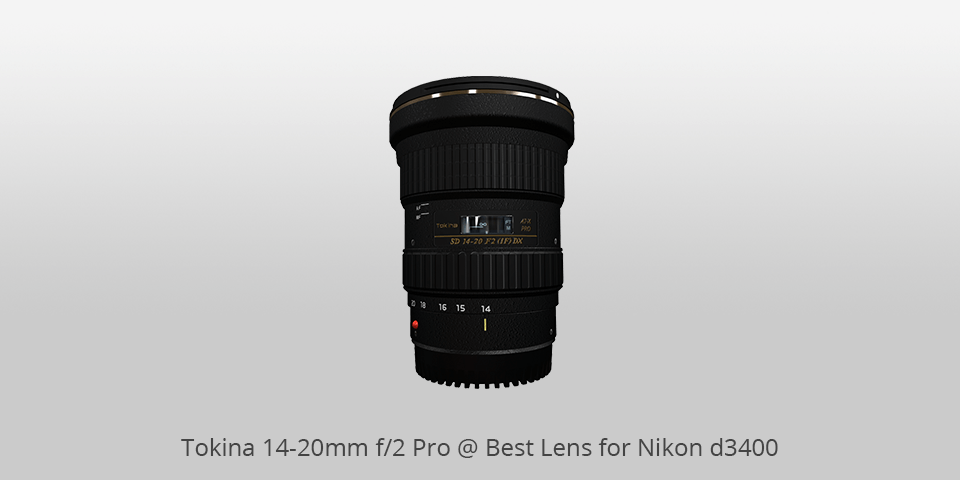
Mount: Pro | Diaphragm blades:9 | Autofocus: good | Min focus distance: 28cm| Max magnification: 0.12x | Filter thread: 14 mm | Dimensions (WxL): 20mm | Weight: 1.60 lbs
⊕ Top-quality
⊕ Small size
⊖ Focus issues
It’s a fast wide angle lens for Nikon D3400 that covers a short 21-30mm equivalent focal length range and maintains a bright, stable f/2 maximum aperture. This lens provides great sharpness and clarity across the entire wide-angle range.
It boasts a set of aspherical and Super Low Dispersion elements, which allow it to reduce chromatic and spherical aberrations. Lens elements have also a multi-layer, anti-reflective coating, which helps minimize flare and ghosting to achieve a better contrast and color rendering when shooting in too bright lighting conditions.
Due to the internal focusing design, this lens provides precise autofocus operation, which can be quickly changed for manual control via the one-touch focus clutch mechanism.
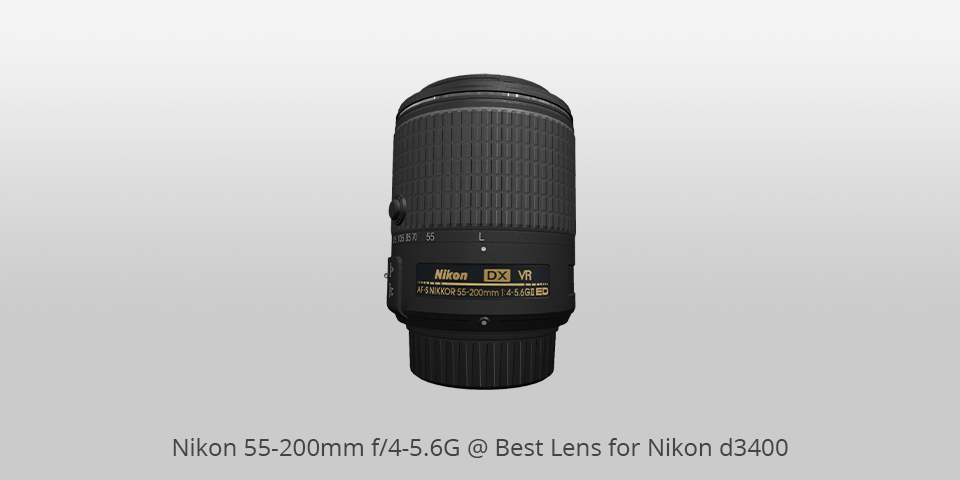
Mount: F| Diaphragm blades: 7 | Autofocus: good | Min focus distance: 1.1 m | Max magnification: 0.23x| Filter thread:55 mm | Dimensions (WxL): 200 mm | Weight: 0.66 lbs
⊕ Small size
⊕ Variable focal length
⊕ Super Integrated Coating
⊖ Vibration at certain shutter speeds
It is one of the best lenses for Nikon D3400 as it has an interesting design, is small and doesn’t weight much, due to which you can easily carry it with you while traveling. Its universal zoom ranges from 55mm, which is suitable for taking portraits and group photos, to 200mm, which is good for shooting close-ups at sports and school events.
Due to the VR feature, all your pictures will be sharp and videos will be stable. Super Integrated Coating delivers great color quality, minimizes ghosting and flare.
Extra-low dispersion glass practically reduces optical distortion, and a rounded seven-blade diaphragm makes defocused elements appear more natural. It is a nice lens for multiple purposes.
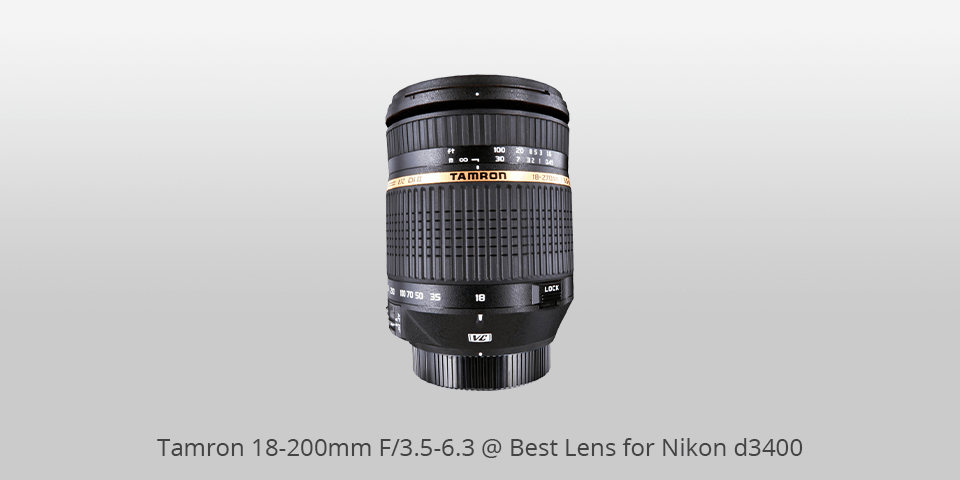
Mount: F | Diaphragm blades: 7 | Autofocus: good | Min focus distance: 0.77m | Max magnification: 0.27x | Filter thread: 62 mm | Dimensions (WxL): 200 mm | Weight: 0.88 lbs
⊕ Nice focal range
⊕ Extremely lightweight
⊕ Waterproof
⊖ Occasional flare
This Nikon D3400 zoom lens has a focal length ranging from 18 to 200mm and can shoot practically anything. It is lightweight, made of high-quality materials and is perfect for those who don’t have much experience in photography.
The autofocus is very fast and almost silent, which is perfect for taking sharp photos of various events. Being the lightest lens on the market, it weighs only 14.1 oz.
That’s why it’s convenient to carry with you everywhere. It has the necessary zoom range for everyday photos and offers enough flexibility for taking group photos in small spaces and zooming in on subjects that are far away from you.
| Image | Name | Features | |
|---|---|---|---|
 |
Nikon 200-500mm f/5.6E
Our choice |
CHECK PRICE → | |
 |
Nikon 18-55mm f/3.5-5.6G
High quality |
CHECK PRICE → | |
 |
Nikon 10-20mm f/4.5-5.6G
Compact |
CHECK PRICE → |

Aperture is important to consider when choosing lenses compatible with the Nikon D3400, and it’s written as a number like f/2.8. If an aperture number is small, a camera will let more light in.
An aperture between f/2.4 and f/3.2 is suitable for most photographers. Usually, a high aperture number means a smaller price of the lens. Telephoto lenses frequently have bigger aperture numbers.
A prime lens has a fixed focal length. The most common models have 35mm or 50mm focal lengths. Since they don’t have a zoom ring, these lenses are easy to use and provide great image quality for a cheaper price. Fixed lenses are perfect for taking portraits.
Unlike a fixed lens, a zoom lens can have different focal lengths. They are more expensive, larger and bulkier than fixed lenses. Being quite compact, they can be easily carried around as one zoom lens can replace a lot of different lenses.

A focal length refers to the distance from the center of a lens to the sensor when you focus on the subject. It’s measured in millimeters.
A low number means a wide shot. If a number is high, the zoom will be longer. If you want to capture more in the frame, consider using wide-angle focal lengths like 14mm, 20mm, 24mm, 28mm and 35mm.
However, if you want to get closer to the subject, choose a telephoto lens with a focal length ranging from 50 to 100mm.
An average wide-angle lens has an 18mm focal length, which is suitable for taking photos of landscapes, architecture and environmental portraits. 55mm is a short telephoto lens, which can be used for compressing perspective, shooting portraits, zooming in on details.
In most cases, lenses are more significant than a camera. A simple DSLR camera with a good lens will take better photos than a $10,000 professional camera with a bad lens.
A 50 mm is a prime lens with a fixed focal length, so you won’t be able to zoom in with it. The maximum aperture of the 18-55mm lens at 50 mm is f/5.6, where the maximum aperture at 50mm is f/1.8. This lens lets about 10x more light in than an 18-55mm lens, which is perfect for poor light conditions.
If you work with a 50mm lens at f/1.8 and take pictures of an object at 4 feet, the depth of field will be about 1.5 inches. However, if you take a photo of this object from 10 feet, the depth of field will be less than 10 inches.

 Rating
Rating